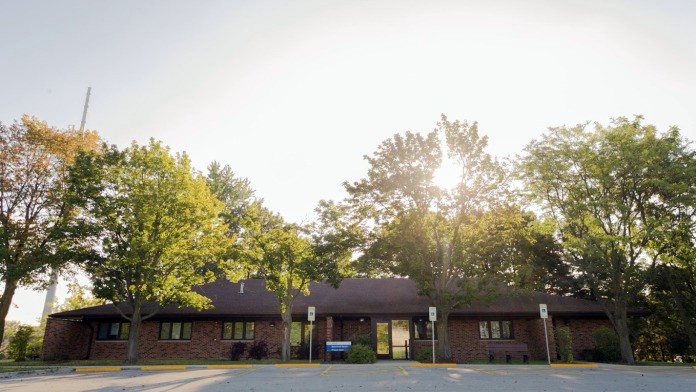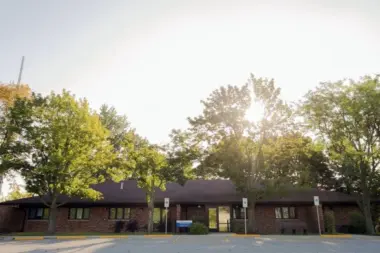What can I say? I feel blessed to have been part of your program. I wouldn't be where I am today if it wasn't for you. THANK YOU ALL for your support and kindness.
About Lake County Behavioral Health – Libertyville Health Center
Lake County Behavioral Health – Libertyville Health Center, is located in Libertyville, Illinois. This is a health center that supports adults, children and families who need medical and mental health services.
They have a dedicated mental health program for adults. While they don’t offer treatment for substance use, you can turn to this facility for an initial assessment of your health needs. From there, you can get referred to specialized addiction treatment services offered through Lake County Behavioral Health.
Federally Qualified Health Center
This location is recognized as a Federally Qualified Health Center, meaning they serve residents from all walks of life and will treat you even if you don’t have the ability to pay. They accept policies from most major insurance providers including Medicaid, Medicare and the Children’s Health Insurance Program. Services are offered in both English and Spanish.
First Point of Contact for Addiction Recovery
While this facility doesn’t offer dedicated services for addiction struggles, they can still help support you and your loved ones on your path to recovery. Some of the ways they’ll serve you is through comprehensive medical and mental health screenings that can determine what factors are contributing to your substance struggles.
Referrals for Specialized Addiction Treatment
Their specialists can refer you to appropriate support resources. One such referral service is the county’s Addiction Treatment Program. This program can connect you to a continuum of services ranging from stabilization and inpatient rehab to comprehensive counseling services to address a co-occurring disorder. This program also incorporates holistic therapies like expressive arts classes, psychoeducation, interpersonal and life skills training along with anger management and relapse prevention programs.
Wraparound Services
The Liberty Health Center has served as a first step for many residents throughout Lake County. By taking this first step, you’ll get connected to a host of wraparound services ranging from specialized behavioral health care services to housing support to social services for you and your family.
Latest Reviews
Rehab Score
Gallery


Accepted Insurance
Other Forms of Payment
Medicaid is a state based program that helps lower-income individuals and families pay for healthcare. Medicaid covers addiction treatment so those enrolled can use their coverage to pay for rehab. When a program accepts Medicaid the client often pays very little or nothing out of their own pocket.
Private insurance refers to any kind of healthcare coverage that isn't from the state or federal government. This includes individual and family plans offered by an employer or purchased from the Insurance Marketplace. Every plan will have different requirements and out of pocket costs so be sure to get the full details before you start treatment.
Self-pay involves paying for treatment out of your own pocket. You can use savings or credit, get a personal loan, or receive help from family and friends to fund your treatment. If you don't have insurance or your insurance plan doesn't cover a specific program, self-pay can help ensure you still get the care you need.
Financial aid can take many forms. Centers may have grants or scholarships available to clients who meet eligibility requirements. Programs that receive SAMHSA grants may have financial aid available for those who need treatment as well. Grants and scholarships can help you pai for treatment without having to repay.
Sliding scale payments are based on a client's income and family size. The goal is to make treatment affordable to everyone. By taking these factors into account, addiction recovery care providers help ensure that your treatment does not become a financial burden to you or your family, eliminating one barrier to care.
Medicare is a federal program that provides health insurance for those 65 and older. It also serves people under 65 with chronic and disabling health challenges. To use Medicare for addiction treatment you need to find a program that accepts Medicare and is in network with your plan. Out of pocket costs and preauthorization requirements vary, so always check with your provider.
Addiction Treatments
Levels of Care
The purpose of this program is to prevent and treat chronic/severe emotional and psychiatric disorders. Services in this program include diagnostic evaluation, psychiatric assessment, and crisis intervention to adults who have a history of chronic mental illness. Clients who receive their psychiatric medication services may also qualify for individual and/or group psychotherapy, depending on the type of funding the client has.
12-step programs are addiction recovery models based on Alcoholics Anonymous (AA). A number of substance abuse programs (including some drug and alcohol rehab centers) use the 12 steps as a basis for treatment. Beginning steps involve admitting powerlessness over the addiction and creating a spiritual basis for recovery. Middle steps including making direct amends to those who've been hurt by the addiction, and the final step is to assist others in addiction recovery in the same way. 12-Step offshoots including Narcotics Anonymous (NA), Cocaine Anonymous (CA), Dual Recovery Anonymous (DRA), Sex and Love Addicts Anonymous (SLAA) and Gamblers Anonymous (GA).
Completing a drug or alcohol rehab program shouldn't spell the end of substance abuse treatment. Aftercare involves making a sustainable plan for recovery, including ongoing support. This can include sober living arrangements like halfway houses, career counseling, and setting a patient up with community programs like Alcoholics Anonymous (AA) or Narcotics Anonymous (NA).
The shared apartment program is supported, transitional housing designed to assist individuals to achieve necessary skills to live independently in the community. CILA (Community Integrated Living Arrangements) is a supervised, supportive service to those individuals with severe emotional difficulties who have had at least 3 hospitalizations in a state-operated facility. The goal of CILA is to promote residential and emotional stability through carefully tailored service planning with client, family, significant others and staff of Behavioral Health.
Treatments
The central task of the Dual Diagnosis Group is to help clients learn more about the interaction between addiction and mental illness, and to help them increase stability in adult functioning through the establishment of sustained sobriety and continued recovery from mental illness. You must be receiving services from at least one of our Behavioral Service programs to be in this group.
Mental health rehabs focus on helping individuals recover from mental illnesses like bipolar disorder, clinical depression, anxiety disorders, schizophrenia, and more. Mental health professionals at these facilities are trained to understand and treat mental health issues, both in individual and group settings.
Programs
Adult rehab programs include therapies tailored to each client's specific needs, goals, and recovery progress. They are tailored to the specific challenges adult clients may face, including family and work pressures and commitments. From inpatient and residential treatment to various levels of outpatient services, there are many options available. Some facilities also help adults work through co-occurring conditions, like anxiety, that can accompany addiction.
Young adulthood can be an exciting, yet difficult, time of transition. Individuals in their late teens to mid-20s face unique stressors related to school, jobs, families, and social circles, which can lead to a rise in substance use. Rehab centers with dedicated young adult programs will include activities and amenities that cater to this age group, with an emphasis on specialized counseling, peer socialization, and ongoing aftercare.
Clinical Services
Cognitive Behavioral Therapy (CBT) is a therapy modality that focuses on the relationship between one's thoughts, feelings, and behaviors. It is used to establish and allow for healthy responses to thoughts and feelings (instead of unhealthy responses, like using drugs or alcohol). CBT has been proven effective for recovering addicts of all kinds, and is used to strengthen a patient's own self-awareness and ability to self-regulate. CBT allows individuals to monitor their own emotional state, become more adept at communicating with others, and manage stress without needing to engage in substance abuse.
In the DBT Group patients must be involved in individual therapy at the clinic to be in this group. The group uses instructional lecture, group discussion, behavioral rehearsal with modeling and role-play, written handouts, and homework assignments to help you decrease unmanageable issues in your life. Mindfulness skills are central to this group.
Family involvement with treatment, when clinically helpful to a client's progress, is encouraged. Case managers are available to assist families in obtaining the resources necessary to restore balance. They strive to help youth and their families develop positive coping techniques, communication skills and the means to manage mental health issues, while maintaining a healthy lifestyle.
Group therapy is any therapeutic work that happens in a group (not one-on-one). There are a number of different group therapy modalities, including support groups, experiential therapy, psycho-education, and more. Group therapy involves treatment as well as processing interaction between group members.
In individual therapy, a patient meets one-on-one with a trained psychologist or counselor. Therapy is a pivotal part of effective substance abuse treatment, as it often covers root causes of addiction, including challenges faced by the patient in their social, family, and work/school life.
The Trauma Treatment Program provides services to Lake County residents, ages 2 through 18, who have experienced trauma. Trauma Focused—Cognitive Behavioral Therapy is an evidenced-based treatment proven effective in working with children and adolescents who have experienced trauma. TF-CBT teaches us how to cope with unhelpful or inaccurate thoughts, confusing and overwhelming feelings, and unhealthy or risky behaviors that the experience of trauma many times causes. Topics include: Education about Trauma, Relaxation, How to Identify and Express Emotions.
Amenities
-
Private Setting
Staff & Accreditations
Staff
Sam Johnson
Interim Executive Director
Kimberly Burke
Director of Healthcare Operations
Angela Cooper
Director of Finance and Administrative Services & CFO
Michele Esser
Interim Director of Behavioral Health
Jerry Nordstrom
Director of Business Operations
John Wurl
Director of Health Informatics and Technology
Accreditations

The Joint Commission, formerly known as JCAHO, is a nonprofit organization that accredits rehab organizations and programs. Founded in 1951, the Joint Commision's mission is to improve the quality of patient care and demonstrating the quality of patient care.
Joint Commission Accreditation: Yes
Contact Information
18698 Peterson Road
Libertyville, IL 60048
